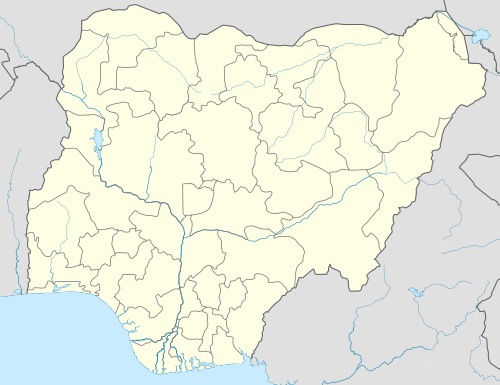Ozoro
Ozoro is the headquarters of the Isoko North Local Government Area, one of the two administrative units in the Isoko region of Delta State, southern Nigeria. Ozoro had been incorrectly spelt "Usoro" in some older maps of Nigeria.
Ozoro | |
|---|---|
 Ozoro Location in Nigeria | |
| Coordinates: 5°32′18″N 6°12′58″E | |
| Country | |
| State | Delta State |
Etymology
The oral tradition passed on to the present generation, talks proudly of the descent and origin of Ozoro from “Aka or Edo n’ Ubini” as the Great Benin Kingdom is fondly referred to its people.
History
Ozoro is said to have been founded by Opute who migrated with his wife, Ozoro, in the 7th Century from the shores of Igodomigodo or ancient Benin Kingdom to Isokoland in the Niger Delta Region. This was during the reign of Ogiso Orrorro, the 7th Ogiso (King) of Great Benin Kingdom (600 – 618AD).
The ancestor and founding father of Ozoro, Opute, was a great warrior. In the company of his wife, he migrated from Ancient Benin. Opute's decision to leave his birth place was forced on him by circumstances. There was trouble at home which made him a persona non grata. Oral tradition has it that Opute and Ogwaran were sons of the same father but from different mothers. Their mothers had a quarrel in the market place that resulted in a fight. Opute's younger brother, Okpe, shot an arrow during the fight which mistakenly blinded Ogwaran's mother. Opute scared of the wrath and anger of his brother Ogwaran, a giant with legendary strength, fled Benin Kingdom with his wife Ozoro, Okpe his younger brother, and his brothers from the same mother, namely; Odume, Osumiri, Ozormo, Etimi, Iselegwu and Obodogwa. Ogwaran's medicine man known as Obogelowo gave a hot pursuit to Opute and his brothers. On getting to Ologbo River, Obogelowo stopped the pursuit and returned to the land of Benin, he could not cross the river for fear of losing his magical powers. Opute is said to have left the shores of Benin armed with a plethora of magical powers for victory in warfare and success in life endeavours. His father gave him a magical staff (“Usu”), the seed of a possession tree, and the replication/artifacts of his own deity.
In Opute's flight from Benin, his magical “Usu” was put to use by him to test for a favourable place of settlement. In every likely place of settlement, he performed the ritual of thrusting the “Usu” into the ground and pulling it out. If he successfully pulled it out, such a place was regarded as not suitable for settlement. After so many suns and moons in his journey of destiny, after crossing so many rivers and streams, subduing both attacking beasts and men, and testing many other places which the “Usu” rejected, he finally arrived upland in the heart of the Niger Delta. Here, he thrusts his “Usu” into the ground at the exact location where Eri-Okpe Community deity is housed today. At this fortuitous spot, he could not pull the Usu off the ground as was the case in previous “unwanted” locations. The powers that followed, led and backed him, had chosen and approved his divine settlement! He planted the possession tree at this place to possess the land and he built a shrine for the ancestral deity on the same spot. His younger brother, Okpe, later became known as Eri-Okpe after the name of its high priest Okpe. As at today, the age-long family that produces the deity's high priest is known and called the Okpe family or “Olua-Okpe”.
Opute gave birth to five sons, who settled in Uruto, Erovie, Etevie, Urude and Uruamudhu, in order, who fanned out and settled in star-fashion from Ala which represents the geographical and administrative center of Ozoro, in a manner very reminiscent of the present ring road in Benin City
Politics and Government
As the administrative center for the local government, it houses the council offices. Ozoro is made up of five communities: Uruto, Erovie, Etevie, Urude , Uruamudhu.
The traditional ruler and custodian of the people's customs and traditions is the Ovie. The Ovie is influential in Isokoland in matters relating to Ozoro. He is also a member of the state council of traditional rulers, which also provides him an additional platform for influence on statewide matters.
Economy
The main economic activity is food crop farming accompanied by some hunting. And the staple food crops include cassava and yams. Women form a large proportion of the farming population. They also engage in trade of food crops for cash to meet other basic household needs. On market days, Ozoro women can be seen selling assorted wares in the town market. Cassava is the source of most of the food consumed by the Ozoro people. Garri, starch meal (Ozi) and Egu are cassava derivatives.
Demographics
There is no definitive population census figure for Ozoro and, indeed, all of Isoko.[1] However, Ozoro is one of the largest communities in Isokoland, both in terms of size and population.
Education
Ozoro has several primary, secondary and post-secondary schools. Secondary institutions in Ozoro include Notre Dame College, Saint Joseph College, and Anglican Grammar School (formerly a girls-only school called "Anglican Girls Grammar School"). Post-secondary institutions include the Delta State Polytechnic, Ozoro.
Religious Beliefs
Although the predominant religion in Ozoro is Christianity, many natives still practice pagan worship. This is evident in the several ancestral shrines that can still be seen in Ozoro. A critical appraisal of the belief system of the average Ozoro indigene will reveal a combination of both Christian and pagan leanings.
Further reading
- Dr. S. B. Omoregie's “Ozoro in the History of Great Benin”